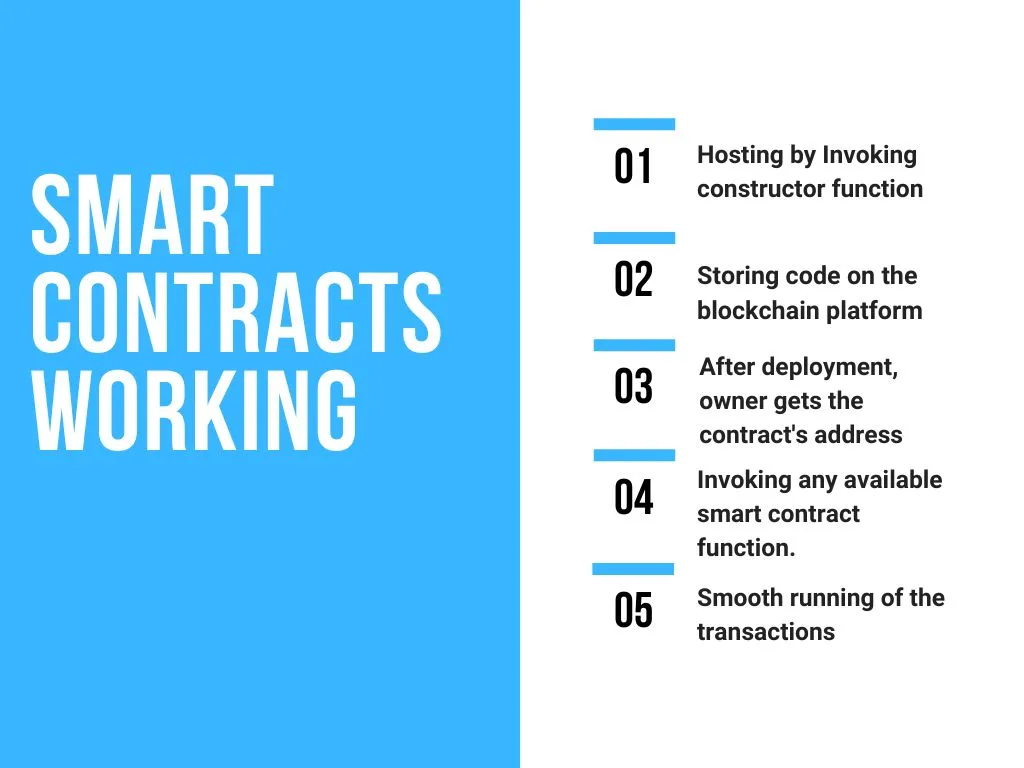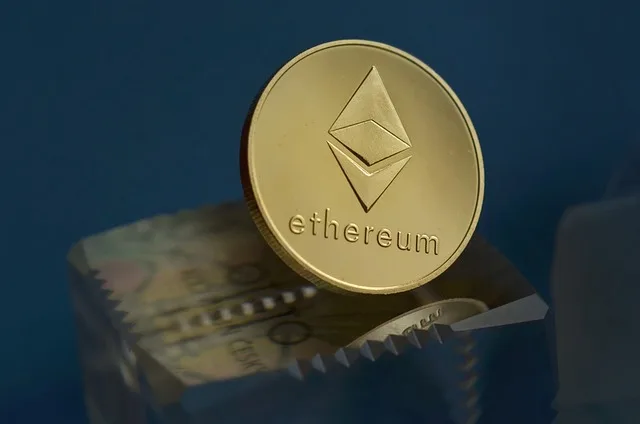Smart contracts are the intelligent means to automate multiple types of agreements using blockchain technology. Blockchain allows multiple nodes to collaborate on securing and maintaining shared transaction records in a distributed manner without depending upon the central authority. Nick Szabo discovered this idea in the 1990s. These contracts have wide applications in finance, trading, real estate, healthcare, and so on. Ethereum is presently the most popular smart contract platform, but other cryptocurrencies can also handle them, including EOS, Neo, Tezos, Tron, Polkadot, and Algorand.

What are smart contracts?
A smart contract is typically a blockchain code that initiates, conducts, and implements the contract terms. It reduces the need for trusted intermediaries, arbitration costs, fraud losses, and malicious and random errors. After qualifying set criteria, contracts are automatically processed. The particular assets are released to the involved parties. You need to pay nominal fees instead of paying tons of money in the traditional approach.
Specifically, a smart contract can define its constructor function, which enables it to be designed. An invocation of the constructor function through a transaction makes a smart contract hostable on the blockchain, and the transaction’s sender becomes its owner. Smart contracts can also define self-destruct functions. This function is usually only accessible to the smart contract owner. There are a number of components that make up contracts including state variables, functions, function modifiers, events, and structures that allow the contract terms to be executed and controlled accordingly. Furthermore, it is even capable of making calls to other contracts.
States and functions are included in every smart contract. States consist of the wallet address of owners. There are two types of states on the blockchain: constant and writable. Constant states can’t be changed, while writable states can be saved. Functions are codes that can read or modify states. They are classified into read-only functions and write functions.

Smart contracts platforms
Ethereum
Let’s start with the most popular platform! With the help of its Turing-complete virtual machine, called the Ethereum virtual machine (EVM), advanced and customized smart contracts can be implemented. Turing-complete is the ability to simulate any computer program. Each Ethereum node runs an EVM implementation and executes the same instructions as EVM is the runtime environment for smart contracts. Using Solidity (a programing language), smart contracts are written, and their code is compiled into EVM bytecode and deployed to the blockchain. As a leading platform for smart contracts, Ethereum allows developers to create a wide variety of decentralized applications (DApps) in different streams.

Read more, 9 valuable facts of NFT to watch out for.
Bitcoin
It can process transactions with little computing capability. It uses a stack-based bytecode language which is not effective to design smart contracts. Several modifications and alterations are necessary for mining functions and incentivization schemes to build contracts using bitcoin.

NXT
Powered by a proof-of-stake consensus protocol (blockchain algorithm), it is an open-source blockchain platform. It contains a selection of currently active smart contracts. It is not Turing-complete, so only the existing templates can be used, and users cannot deploy customized them.
Applications of smart contracts
Finance
- Investment banking and Capital markets: Smart contracts can considerably reduce the settlement cycles from 20 days to roughly 6-8 days. Therefore, it is gaining attention from customers as they bypass the traditional capital market. Ultimately, it is supposed to boost the demand rate.
- Commercial and retail banking: Smart contracts avoid delays and reduce expenses by automating the transaction process. This will be highly beneficial for the mortgage loan industry. In the traditional approach, loans are difficult to process due to funding and services causing uncertain delays and high expenses. Smart contracts can easily digitize and generate documents with blockchain.
Insurance: Using smart contracts in the insurance industry can also reduce processing overheads and save money, particularly when handling claims. Sharing legal documents on the distributed ledger can automate the settlement of claims, reducing claim processing time and costs, and improving efficiency.
IoT
The prominent field of IoT (Internet of things) combines smart entities into the internet to provide value to customers. Smart contracts when blended with IoT can yield magical results. In IIoT, a centralized server controls the ecosystem. Various IoT devices are only able to get firmware updates from the central server by querying the server manually. This problem can be solved automatically with smart contracts. Throughout the network, manufacturers can deploy smart contracts containing firmware update hashes. These can send firmware hashes automatically to devices. This saves a lot of resources.
Read more, know these 11 IoT FAQs to be smarter.
System Security
The security of distributed systems can be tightened against threats such as DDoS (Denial-of-Service) by smart contracts. Cybercriminals bombard the system with excessive requests resulting in the suspension of internet services. Smart contracts can protect the system in a decentralized way. The IP addresses of the attackers will be automatically recorded in a smart contract when a server is attacked. Thus, other nodes will be notified of attackers’ addresses. In addition, other security measures, such as filtering malicious traffic, will be immediately executed.
Read our article about exploring cybersecurity modes and classes.
Economy
Sharing economies can reduce consumer expenditures by allowing customers to borrow and recycle items. These economies can also enhance resource utilization, improve service quality, and reduce environmental effects. Despite this, most current sharing economy platforms suffer from high transaction costs, privacy breaches, and unreliable third parties. These platforms could be decentralized by smart contracts. In a recent study, Bogner et al. proposed a sharing economy platform using Ethereum. This system enables users to register and share items without relying on a third party. At the same time, personal information is protected as well. Additionally, smart contracts and IoT can advance applications of the sharing economy., Huckle et al. suggested sharing economy applications using IoT and blockchains such as peer-to-peer automated payment systems, travel systems, digital asset management, and currency exchange platforms. These applications were also proposed with privacy considerations.
Because smart contracts are decentralized, self-enforcing, and verifiable, their business rules can be executed in a peer-to-peer network without the involvement of a trusted authority or central server. Each node is “equal” and none has any special authority. Therefore, they have the potential to revolutionize a number of traditional industries, including finance, healthcare, energy, etc.




[…] platform that consists of programming languages that can build other blockchain applications like smart contracts and Ethereum virtual […]
[…] signed through different kinds of agreements. Nick Szabo introduced this concept back in the 1990s. Smart contracts are the programs stored in the blockchain that run after fulfilling prerequisites. They […]